Sign up for our monthly Leap Update newsletter and announcements from the Leap Ambassadors Community:
By clicking "Stay Connected" you agree to the Privacy Policy
By clicking "Stay Connected" you agree to the Privacy Policy
Our Common Definition of High Performance
Without a thoughtfully developed, thoroughly vetted definition of “high performance,” any call for raising performance in our sector rings hollow.
Definition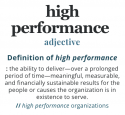
Courageous, Adaptive Executive and Board Leadership
Leadership, the preeminent pillar of high performance, helps your organization embark on a journey to make it even stronger.
Practice Imperative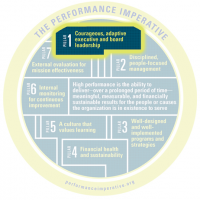
Disciplined, People-Focused Management
Join forces to make your disciplined and people-focused management even stronger.
Practice Imperative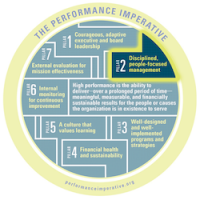
Well-Designed And Well-Implemented Programs And Strategies
Well-designed and well-implemented programs help the people and causes you serve.
Practice Imperative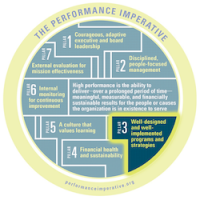
Financial Health And Sustainability
Get on the path to long-term financial sustainability.
Practice Imperative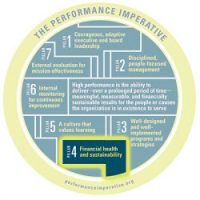
A Culture That Values Learning
Double down on developing a culture that values learning.
Practice Imperative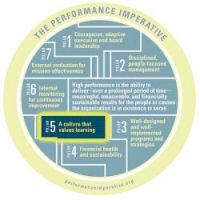
Internal Monitoring For Continuous Improvement
Internal data help you make decisions that leads to continuous improvement.
Practice Imperative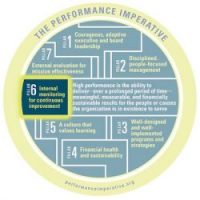
External Evaluation For Mission Effectiveness
External evaluation can help you ensure mission effectiveness.
Practice Imperative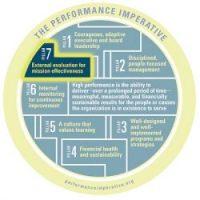
Home / The Here and Now / Equity Resources
As shared by the Leap Ambassadors Community
Book
Caste: The Origins of Our Discontents
Isabel Wilkerson, Random House, August 2020
Wilkerson gives us a masterful portrait of an unseen phenomenon in America as she explores, through an immersive, deeply researched narrative and stories about real people, how America today and throughout its history has been shaped by a hidden caste system, a rigid hierarchy of human rankings. (Amazon)
Podcast
Isabel Wilkerson wants to change how we understand race in America
Ezra Klein, Vox.com, August 2020.
Isabel Wilkerson and Ezra Klein have a 90-minute discussion about her theory that America is a caste system that should be analyzed in the way we, as Americans, analyze castes in other countries.
Podcast
It’s More Than Racism: Isabel Wilkerson Explains America’s ‘Caste’ System
Terry Gross, NPR, August 2020.
In a 38-minute podcast with Terry Gross, Isabel Wilkerson says racism is an insufficient term for the systemic oppression of Black people in America. She prefers to refer to America as having a “caste” system.
Book
On Intersectionality: Essential Writings
Kimberle Crenshaw, The New Press, February 2014.
In this comprehensive and accessible introduction to Crenshaw’s work, readers will find key essays and articles that have defined the concept of intersectionality, collected together for the first time. The book includes a sweeping new introduction by Crenshaw as well as prefaces that contextualize each of the chapters. (Columbia Law School).
Book
The Warmth of Other Suns
Isabel Wilkerson, Random House, September 2010.
The Pulitzer Prize–winning author chronicles one of the great untold stories of American history: the decades-long migration of black citizens who fled the South for northern and western cities, in search of a better life. (Penguin Random House)
Article
Working toward gender diversity and inclusion in medicine: myths and solutions
Sonia K. Khang and Sarah Kaplan, The Lancet, February 2020.
Authors present five myths and five solutions for gender diversity in the field of medicine.
Book
Stamped From The Beginning: The Definitive History of Racist Ideas in America
Ibram X. Kendi, Bold Type Books, April 2016.
Stamped From the Beginning uses the life stories of five major American intellectuals to offer a window into the contentious debates between assimilationists and segregationists and between racists and antiracists. From Puritan minister Cotton Mather to Thomas Jefferson, from fiery abolitionist William Lloyd Garrison to brilliant scholar W.E.B. Du Bois to legendary anti-prison activist Angela Davis, Kendi shows how and why some of our leading proslavery and pro-civil rights thinkers have challenged or helped cement racist ideas in America. (National Book Foundation)
Book
The Color of Law: A Forgotten History of How Our Government Segregated America
Richard Rothstein, Liveright, May 2017.
Rothstein describes how the American government systematically imposed residential segregation: with undisguised racial zoning; public housing that purposefully segregated previously mixed communities; subsidies for builders to create whites-only suburbs; tax exemptions for institutions that enforced segregation; and support for violent resistance to African Americans in white neighborhoods. (WW Norton)
Book
The New Jim Crow: Mass Incarceration in the Age of Colorblindness
Michelle Alexander, New Press, January 2020.
A civil-rights lawyer’s disturbing view of why young black men make up the majority of the more than two million people now in America’s prisons. (Kirkus Reviews)
Guide
Equity Guide for Nonprofit TechnologyThe Warmth of Other Suns
NTEN, September 2020.
Guidebook for using technology in racially equitable ways.
Toolkit
An Antiracist Framework for Scholarly Publishing
Niccole Coggins, Jocelyn Dawson, Melanie Dolechek, Gisela Concepcion Fosado The Scholarly Kitchen, August 2020.
Toolkits for antiracism in the scholarly publishing community.
Book
How to be an Antiracist
Ibram X. Kendi, One World, August 2019.
In How to Be an Antiracist, Kendi takes readers through a widening circle of antiracist ideas—from the most basic concepts to visionary possibilities—that will help readers see all forms of racism clearly, understand their poisonous consequences, and work to oppose them in our systems and in ourselves. (Amazon)
Article
Making Differences Matter: A New Paradigm for Managing Diversity
David A. Thomas and Robin J. Ely, Harvard Business Review, September-October 1996.
Written in 1996 (!), the authors explore three paradigms (equality and fairness, access and legitimacy, and connecting diversity to work perspectives) and include concrete examples for how they do (or don’t) work. They also explain eight preconditions that must be present to achieve the paradigm of connecting diversity to work perspectives.
Report
Providing Student Support Services in Extraordinary Times: A Caring Campus Approach. Guide Three, Incorporating Racial Equity into Caring Campus
Institute for Evidence-Based Change, 2020.
Suggestions for how behavioral commitments (face-to-face and virtual) can be practiced authentically and equitably.
Guide
Race Equity and Inclusion Action Guide
Annie E. Casey Foundation, January 2015.
Seven steps to advance equity and inclusion in an organization.
Guide
Blog Racial Equity Guidelines
Urban Institute, Accessed July 2021.
Guidelines for applying a racial equity lens when writing a blog post or article for Urban Institute.
Book
Decolonizing Wealth, 2nd Edition
Edgar Villanueva, Berrett-Koehler Publishers, August 2021.
After 14 years in philanthropy, Edgar Villanueva has seen past the field’s glamorous, altruistic façade, and into its shadows: the old boy networks, the savior complexes, and the internalized oppression among the “house slaves,” and those select few people of color who gain access. In equal measure, he denounces the reproduction of systems of oppression while also advocating for an orientation towards justice to open the floodgates for a rising tide that lifts all boats. In the third and final section, Villanueva offers radical provocations to funders and outlines his Seven Steps for Healing. (Amazon)
Book
The Color of Wealth
Barbara Robles, Betsy Leondar-Wright, Rose Brewer, The New Press, June 2006.
Written by five leading experts on the racial wealth divide who recount the asset-building histories of Native Americans, Latinos, African Americans, Asian Americans, and European Americans, this book is a uniquely comprehensive multicultural history of American wealth. (Amazon)
Article
Detour Spotting for White Anti-Racists
jona olsson, Cultural Bridges to Justice, January 1997, 2005, 2011, 2015.
Author provides a series of racist statements followed by a reality check and consequence.
Podcast
Seeing White
John Biewen and Chenjerai Kumanyika, Center for Documentary Studies, February 2017.
A series that looks at the racial structures of America, focusing on dissecting the oppressors rather than the oppressed.
Book
White Fragility: Why It’s So Hard For White People to Talk About Racism
Robin DiAngelo, Beacon Press, June 2018.
DiAngelo examines how white fragility develops, how it protects racial inequality, and what we can do to engage more constructively. (Amazon) and The Dehumanizing Condescension of White Fragility (The Atlantic)
Website
White Supremacy Culture
Tema Okun, Accessed July 2021.
Updated from the 1999 article, the site includes white supremacy characteristics as well as racial equity principles.
Video
White Women’s Toxic Tears
Lisa Sharon Harper and Jen Hatmaker, June 2020.
Discussion with Lisa Sharon Harper and Jen Hatmaker calling for a deeper understanding of historical and cultural roots and current patterns of white women betraying people of color.
Blog post
The Imperative of Foundation Board Diversity
Phil Buchanan, Center for Effective Philanthropy, January 2021.
Buchanan makes the case that “Change in the foundation boardroom will only happen when board members decide to make it happen.”
Blog post
Reducing Social Distance, Starting with Governing
Jo Wells, Blagrave Trust, February 2019.
Blog post on how the Blagrave Trust board supported the recommendation for the organization to become youth-led vs. youth-focused, beginning with its governance.
Op-ed
Dear White CEOs: It’s Time To Lead On Racial Justice
Jeff Raikes, Forbes.com, September 2020.
Op-ed based on advice Raikes has received during his own equity and inclusion journey.
Webinar
How Can Boards Join the Movement for Racial Justice? Part 1
Jeanne Bell, Vernetta Walker, and Robin Stacia, Nonprofit Quarterly, June 2020.
Ninety-minute webinar discussing nonprofit board of directors’ responsibility and opportunity for leadership around racial justice.
Webinar
How Can Boards Join the Movement for Racial Justice? Part 2
Jeanne Bell, Vernetta Walker, and Robin Stacia, Nonprofit Quarterly, July 2020.
Part two (90 minutes) of the webinar discussing the board’s role in equity and inclusion as governance. Presenters share best practices and suggestions for holding the board accountable and measuring the outcomes.
Article
CEO Blueprint for Racial Equity
PolicyLink, July 2020.
“…a roadmap to help companies understand and address the intended and unintended consequences of all their products, policies, and practices on people of color, and by extension, our economy and democracy.”
Blog post
Race, Equity, and Unavoidable Challenges for Philanthropy
Phil Buchanan, Center for Effective Philanthropy, May 2020.
Post that calls for philanthropy to put equity at the forefront, support organizations that are deeply rooted in the community, and challenge racism and bias when you see it.
Report
Foundations Respond to Crisis: Toward Equity?
Ellie Buteau and Naomi Orensten, Center for Effective Philanthropy, 2020.
Report explores how foundations are supporting communities hit hardest by the COVID-19 pandemic—Black, Latino, Native American, immigrant, lower-income, and people with disabilities—and how exactly foundation leaders say they are reckoning with racism.
Blog post
Foundations Respond to Crisis: Toward Equity?
Kelly Bates, Interaction Institute, July 2020.
Blog post on four tensions among board members,staff, and equity change efforts. Pragmatic suggestions are also included.
Op-ed
Foundations Respond to Crisis: Toward Equity?
Art Taylor, Forbes Nonprofit Council, September 2020.
Opinion piece that calls for holding foundations accountable for a lack of diversity on their boards.
Blog post
Recruiting for Board Diversity—Without Disrespecting People of Color
Jim Taylor, BoardSource blog, August 2020.
Blog post on the importance of respectfully diversifying an organization’s board. Boards that only focus on race as a sole qualification are being disrespectful and overly simplistic.
Guide
Awake to Woke to Work: Building a Race Equity Culture
Equity in the Center, 2020.
Framework for building a racial equity culture.
Article
“Woke Washing” Your Company Won’t Cut It
Erin Dowell and Marlette Jackson, Harvard Business Review, July 2020.
Strategies for advancing social justice that go beyond solidarity statements calling out racial injustice without showing signs of action.
Book
Antiracist Organizational Development
Western States Center, Accessed July 2021.
Excerpt from Dismantling Racism project that provides assessment on which stage an organization is in from All White Club to Anti-Racist Organization.
Website
Cultural Competency and Awareness
Cultural Intelligence Center, Accessed July 2021.
Research-based tools, trainings, and assessments to build cultural intelligence in organizations.
Article
Diversity-Related Training: What Is It Good For?
Musa al-Gharbi, Heterodox, September 2020
Author provides a series of research articles that support the view that diversity-related training rarely meets stated goals and can cause unintended and/or unfortunate consequences.
Op-ed
Microaggressions and Psychological Safety: How They Are Linked
Maya Hu-Chan, Inc., December 2020
Based on Subtle Acts of Exclusion: How to Understand, identify and Stop Microaggressions, column offers tips for helping establish psychological safety.
Website
Race to Lead
Building Movement Project, Accessed July 2021.
Report presents findings from a 2019 survey of 5,261 participants and their experiences with diversity, equity, and inclusion in the workplace, including that the findings from the 2017 report still hold true; there is a white advantage in the nonprofit sector; and that diversity, equity, and inclusion efforts are widespread and their effectiveness is uncertain.
Book
So You Want to Talk About Race
Ijeoma Oluo, Seal Press, January 2018.
Oluo guides readers of all races through subjects ranging from intersectionality and affirmative action to “model minorities” in an attempt to make the seemingly impossible possible: honest conversations about race and racism, and how they infect almost every aspect of American life. (Seal Press)
Article
Two Ways to Align Talent to Your Equity Goals
Meera Chary, The Bridgespan Group, June 2019.
Author suggests two ways to reflect organizational values around equity: 1) identify specific competencies that focus on equity-centered behaviors; or 2) infuse equity and inclusion across ALL competencies. Set of sample competencies is included.
Article
Why Doesn’t Diversity Training Work? The Challenge for Industry and Academia
Frank Dobbin and Alexandra Kalev, Anthropology Now, September 2018.
Compilation of research studies that indicate diversity training alone is unlikely to trigger change. Training effectiveness can be improved by making it part of a larger initiative.
Guide
Bridging Differences Playbook
Greater Good Science Center, Accessed July 2021.
Guidebook that includes skills and strategies for bridging divides in intrapersonal, interpersonal, and intergroup settings.
Website
Equity Meets Design
Christine Marie Ortiz Guzman, Accessed July 2021.
Curated list of articles, videos, tools that promote equity by design.
Website
Targeted Universalism
john a. powell, Other and Belonging Institute, Accessed July 2021.
A framework for grounding the idea of what structural belonging and inclusion can look like. Sometimes referred to as Equity 2.0, the framework puts equity into practice and a focus of putting equity over equality.
Memo
Guiding a Giving Response to Anti-Black Injustice
Susan Taylor Batten, Edward M. Jones, Leslie MacKrell, Jerry Petit-Frere, ABFE and The Bridgespan Group, August 2020.
Memo includes six principles guide funders seeking to support racial justice and thriving Black lives in the United States, as well as selected organizations in the Black-led racial justice ecosystem
Article
Racial Equity in Philanthropy
ABFE and The Bridgespan Group, Accessed July 2021.
Collaboration between ABFE and Bridgespan Group that curates a collection of articles focused on dismantling persistent and substantial barriers that leaders of color experience in pursuing funding.
Report
Do I Hear You? Exploring the Listening Culture of Funders in the UK
Nusrat Faizullah, Listening Fund, December 2020.
Author lays out four areas of development for funders in the UK who want to improve their listening practices and cultures.
Article
Does Co-Production Really Empower People?
Mark Brown, Blagrave Trust, Accessed July 2021.
Brown discusses the inequalities that can occur in co-production efforts and suggests five ways to make co-production initiatives better.
Op-ed
Feedback Can Be a Catalyst for Shifting Power and Making Big Changes
Kelley Gulley and Fay Twersky, Chronicle of Philanthropy, November 2019.
Op-ed making the case that feedback from those served can lead to shifting power and making change.
Blog post
Foundations, Act on on What You Control to Confront Racism
Anthony Richardson, Center for Effective Philanthropy, June 2020.
Opinion piece on what practices foundations should consider incorporating to address racial bias.
Article
How to Promote Racial Equity in the Workplace: A five-step plan
Robert Livingston, Harvard Business Review, Sept-Oct, 2020 (tiered access).
Author presents a five-step roadmap for promoting racial equity in the workplace: 1) problem awareness, 2) root-cause analysis, 3) empathy, 4) strategy, and 5) sacrifice.
Website
Continuous Improvement for Equity
Design Team, NSI Exchange, Accessed July 2021.
Site provides a list of critical inquiry questions and curated resources to infuse equity in seven areas. Primarily intended for educators, the site is applicable to other sectors.
Blog post
Equity Matters
Evident Change, October 2018.
Opinion piece that calls for equity to be woven into the way risk tools are developed and validated.
Report
Principles for Predictive Analytics in Child Welfare
Chris Scharenbroch, Kathy Park, and Kristen Johnson, Evident Change, December 2017.
Use of predictive analytics MUST take place in the context of explicitly defined values and principles. Paper includes principles for building, applying, developing, and testing predictive models in child welfare.
Article
Risk, Values, and Pre-Trial Reform
Evident Change, September 2018.
Article is a description of how Evident Change works with a broad base of stakeholders to develop risk-assessment tools and how equity must be present in the conversation from the very beginning.
Article
No Small Matters: Reimagining the Use of Research Evidence From A Racial Justice Perspective
David E. Kirkland, William T. Grant Foundation, December 2019.
The author calls for an acknowledgment that research evidence in policy and practice is not a neutral act if the questions of why, who, and for whom research is used aren’t considered. Social, cultural, historical, racial, and political complexities must also be considered in the practice of research.
© Copyright 2025 | Leap of Reason Ambassadors Community. All Rights Reserved.
We use cookies for a number of reasons, such as keeping our site reliable and secure, personalising content and providing social media features and to analyse how our site is used.
Accept & Continue